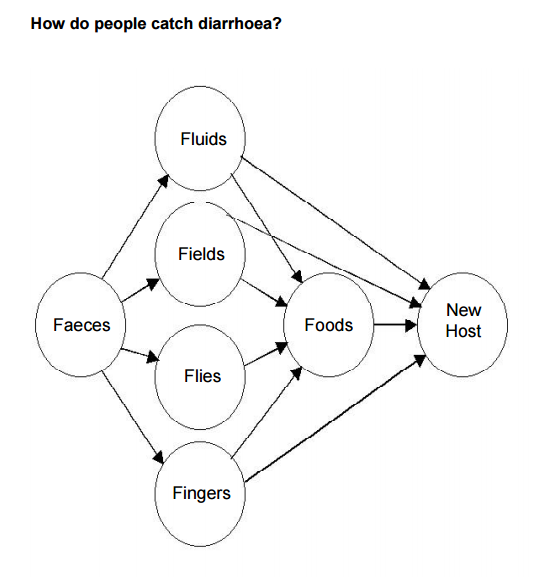Namibia develops videos with UNICEF to communicate the link between WASH and nutrition
At the end of 2013, two sets of media products were developed by the Directorate of Water Supply and Sanitation Coordination (DWSSC) from the Ministry of Agriculture, Water and Forestry (MAWF) in partnership with UNICEF Namibia. The project was funded by the European Union through a grant…
At the end of 2013, two sets of media products were developed by the Directorate of Water Supply and Sanitation Coordination (DWSSC) from the Ministry of Agriculture, Water and Forestry (MAWF) in partnership with UNICEF Namibia. The project was funded by the European Union through a grant to Dessert Research Foundation who administered the project. A creative brief, prepared by a UNICEF Namibia consultant to DWSSC, was given to two production companies who were subsequently contracted to produce the media.
The products were:
- Six simple video animations that illustrate the “F-diagram”* between “faeces and faces” to show how poor hygiene can make us sick and how hygiene behaviour can be improved.
- Two video comedy sketches (with audio versions for radio) were developed to promote handwashing with soap after contact with faeces and before touching food.
These videos were initially conceived as “pilot” media products that were recommended as part of the Open Defecation Free Namibia Communications Strategy, developed by UNICEF Namibia for DWSSC. The overall objective of the videos was to demonstrate how improved water, sanitation and hygeine (WASH) behaviours could be promoted by using such motivations for sustainable behaviour change as disgust, nurture, affiliation and aspiration, rather than through a more conventional hygiene promotion approach that tends to rely on health messages alone.
Dissemination
The videos were launched at the Southern Africa Regional Community Led Total Sanitation (CLTS) workshop held in Windhoek, Namibia in April 2014. Subsequently UNICEF Namibia used them in training Community Outreach Workers from the Namibian Red Cross Society, City of Windhoek and Shack Dwellers Federation during the 2014 Cholera outbreak in Windhoek. Copies were also made available to these organisations for use in community based hygiene promotion activities. Additionally, UNICEF Namibia made copies of the videos available to the Ministry of Health and Social Services for screening in clinics and health centres.
The videos continue to be used for community outreach and training in moderated settings, and for hygiene education in schools. The non-texted versions of the Comedy Sketches are particularly suited to broadcast on television and should be supported by simultaneous broadcast of the audio versions on radio. Additionally the UNICEF Namibia consultant to the DWSSC used some of videos during several trainings of volunteer Home Health Promoters (HHPs) during the Cholera outbreak in South Sudan, in partnership between UNICEF South Sudan and the Government of South Sudan’s Ministry of Health. The animations proved very effective.
“Somewhat surprisingly perhaps, the comedy sketch “Would You Eat That?” proved very popular and highly effective even when shown to a non-English speaking audience in a radically different cultural context. Viewers were able to describe all the key hygiene messages put across by the video.” – Karan Courtney-Haag, Nutrition Specialist Consulant, UNICEF Namibia
Production
The F-diagram animations were produced by Frameflux (now trading as Motion Bones), a Windhoek based graphics and animation company, who interpreted the initial brief in a simple animation style, which was realisable within the relatively limited budget.
The comedy sketches were produced by Free Your Mind, a Windhoek based company of stand-up comedians and actors. They interpreted the brief in a style that they judged to be suited to contemporary popular culture in Namibia.
*The “F-Diagram”
The “F-diagram” is widely used in WASH communication to show how transmission of fecal-oral pathways take place via fingers, flies, fields, foods, and fluids.
